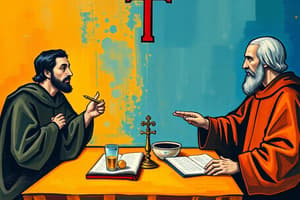Podcast
Questions and Answers
What belief did Luther reject that distinguishes his view on Communion?
What belief did Luther reject that distinguishes his view on Communion?
- Communionism
- Transubstantiation (correct)
- Consubstantiation
- Sacramentalism
Which of the following was a direct outcome of Luther's Reformation?
Which of the following was a direct outcome of Luther's Reformation?
- Establishment of the Papacy's authority over Kings
- Dissolution of all religious orders
- Mandatory celibacy for all clergy
- The fragmentation of Christianity in Europe (correct)
Which strategy was NOT part of the Catholic Counter-Reformation?
Which strategy was NOT part of the Catholic Counter-Reformation?
- Formation of the Jesuits
- Abolition of the Seven Sacraments (correct)
- The Council of Trent
- Reinforcement of the Papacy's authority
What was one of the main decisions made during the Council of Trent?
What was one of the main decisions made during the Council of Trent?
What significant social change occurred due to the Reformation?
What significant social change occurred due to the Reformation?
Which of the following factors contributed to the initiation of the Reformation?
Which of the following factors contributed to the initiation of the Reformation?
What was one of Martin Luther's main ideas that significantly differed from Catholic teachings?
What was one of Martin Luther's main ideas that significantly differed from Catholic teachings?
What was a significant consequence of Martin Luther's protest against the Church?
What was a significant consequence of Martin Luther's protest against the Church?
Which strategy was employed during the Counter-Reformation to address the challenges posed by the Reformation?
Which strategy was employed during the Counter-Reformation to address the challenges posed by the Reformation?
How did the Reformation impact European society?
How did the Reformation impact European society?
Study Notes
Martin Luther's Beliefs
- Luther rejected the Catholic belief in transubstantiation, the idea that the bread and wine of Communion actually transform into the body and blood of Christ. He believed that the bread and wine were only symbols of Christ's presence.
Reformation Outcomes
- The Reformation led to the establishment of Protestantism, a new branch of Christianity that emerged from Luther's teachings.
Counter-Reformation Strategies
- The Counter-Reformation did NOT use forced conversions as a strategy to address the challenges posed by the Reformation.
The Council of Trent
- The Council of Trent, convened by the Catholic Church, reiterated the traditional teachings of the Church, including the importance of good works for salvation, the role of the Pope as head of the Church, and the authority of tradition alongside Scripture.
Social Change
- The Reformation led to a significant increase in literacy as Protestant reformers encouraged the reading of the Bible in vernacular languages.
Reformation Causes
- The call for reform in the Catholic Church was fueled by factors such as corruption within the clergy, the sale of indulgences, and the Church's wealth and power.
Martin Luther's Ideas
- Martin Luther believed that salvation was achieved through faith alone ("sola fide"), a central tenet that contrasted with the Catholic emphasis on good works.
Reformation Consequences
- Martin Luther's protest against the Church's authority and practices triggered a religious and political upheaval throughout Europe, sparking numerous wars and conflicts.
Counter-Reformation Strategies
- The Counter-Reformation employed strategies such as strengthening the Inquisition, emphasizing education and missionary work, and promoting devotional practices to counter the spread of Protestantism.
Reformation Impact
- The Reformation significantly transformed European society by:
- Establishing new Protestant churches
- Fragmenting religious unity
- Promoting religious and intellectual freedom
- Inspiring social and political change in many parts of Europe.
Studying That Suits You
Use AI to generate personalized quizzes and flashcards to suit your learning preferences.
Related Documents
Description
Explore the major events and ideas of the Reformation and the Catholic Counter-Reformation. Understand Martin Luther's challenges to the Church, the establishment of Protestantism, and the Catholic Church's response through reforms like the Council of Trent. This quiz delves into the crucial developments that shaped European religious landscapes.




